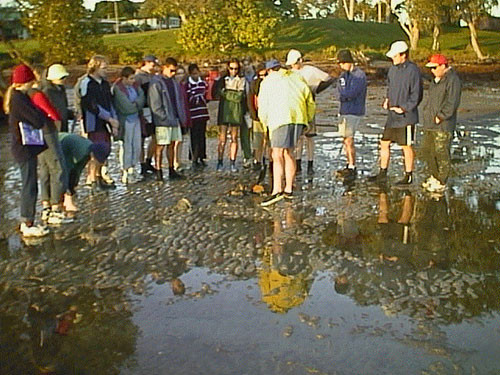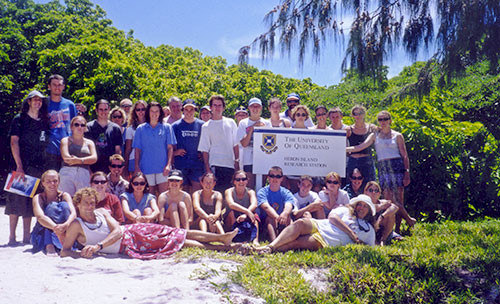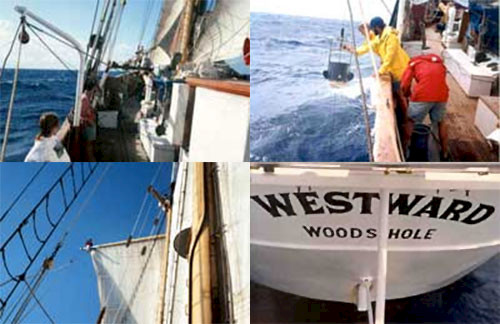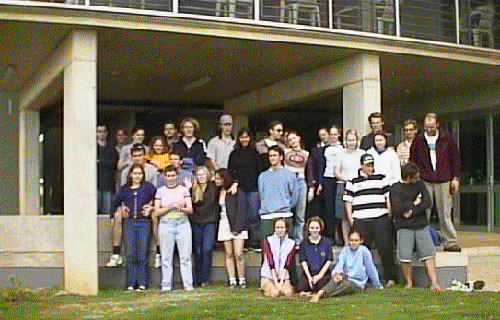Experiential education: Changing the way we teach
Bill Dennison · | Learning Science |My university teaching experience has been quite varied. I have taught first year students in massive lecture halls, graduate students in small groups, and everything in between. At the University of Maryland Center for Environmental Science, we teach using an interactive video network. My attitude about the large lecture setting is that the students forget what I said shortly after I say it, and I forget what I said shortly after I say it. In contrast, if you give me a couple of dozen students for one to several weeks aboard a tall shop or at a research station, I will change the students' lives AND I will have a lot of fun doing it. I have become a strong advocate of experiential education. It can become a learning opportunity for both instructor and student.
Experiential education is about actually doing the topic, rather than reading about it or listening to someone talk about it. Experiential education leads to deep learning. I have asked many people to recall lectures from their educational careers, and they rarely can recall lectures from the university career. In contrast, they invariably remember their field trips, even decades later.
Should we abandon lectures entirely? There are times and places for lectures. When I took University of Queensland students on field trips to Stradbroke or Heron Islands, we would have topical lectures, but these lectures were tied directly to the observations that the students would be making that same day or week. The field trips were coupled to a semester long course on campus, and the lectures were related to the subsequent field trip. The Sea Semester program, based in Woods Hole, MA, has a six week shore component prior to the six week sea component aboard a tall ship. The power of the shore component was in its direct applicability to the impending sea cruise. As students (I was both a student and instructor with this program), we paid attention and really learned what we needed to know, because we knew that we were going to be running the ship and the science program by the end of the six week sea component. I suppose there was a bit of a fear factor that worked as motivator as well. It was scary to be in charge of a sailing ship at sea, and the 'need to know' information was compelling. So, rather than a suite of abstract concepts, the lectures were directly related to the practical component of the course.
In some ways, this type of education, where the student is given the appropriate amount of information that relates to their ongoing experiences, emulates the traditional oral education practiced by indigenous Australians. The Australian aborigines would only provide information relevant to the age of the student, so that they could incorporate and apply that information directly relevant to them. Since an oral education requires memorization, the Western approach of providing information overload would not work.



One of the aspects of field trips is the immersive nature of the experience. It is not one hour of language, one hour of math and one hour of history. It is the concentrated study of a single subject for a significant period of time (days to weeks to months). This concentrated effort promotes a level of learning that one hour time blocks do not allow. Just as anyone attempting to achieve command of a second language knows, total immersion is the only way to develop fluency. The immersive experience allows for integration of theory and practice as well, since there is the necessary time available to read, experiment, analyze and interpret.
As an instructor, one of the benefits of the immersive approach is that I get to know the students individually, as opposed to faces in an audience. In addition, student projects serve as pilot studies and in many cases, student data can be used in peer review publications. I always feel that I learn something new about nature on a field trip, but that I only solidify my knowledge about a subject when teaching in a lecture room. On field trips students and instructors can learn together, with the instructor serving as a guide, rather than the sole arbitrator of knowledge.
Lectures focus on what is known, while research focuses on what is not known. Sharing research experiences with students changes the focus on the unknown, which makes the accumulation of facts less relevant and the weaving together of previous findings with observations more relevant.
I have observed that a positive field trip experience can serve to motivate a student to learn well beyond the actual trip. For a student to see how mathematics can be applied suddenly can make a dull subject compelling, for example.

The new immediate access to facts via the Internet also changes the educational paradigms. Education should be less about content and more about how to think and process information. Content can be accessed easily, but the intellectual frameworks and analytical tools are not easy to access or to learn. If the learning objectives adapt to this reality, students will be better prepared in the real world.
About the author
Bill Dennison

Dr. Bill Dennison is a Professor of Marine Science and Vice President for Science Application at the University of Maryland Center for Environmental Science.